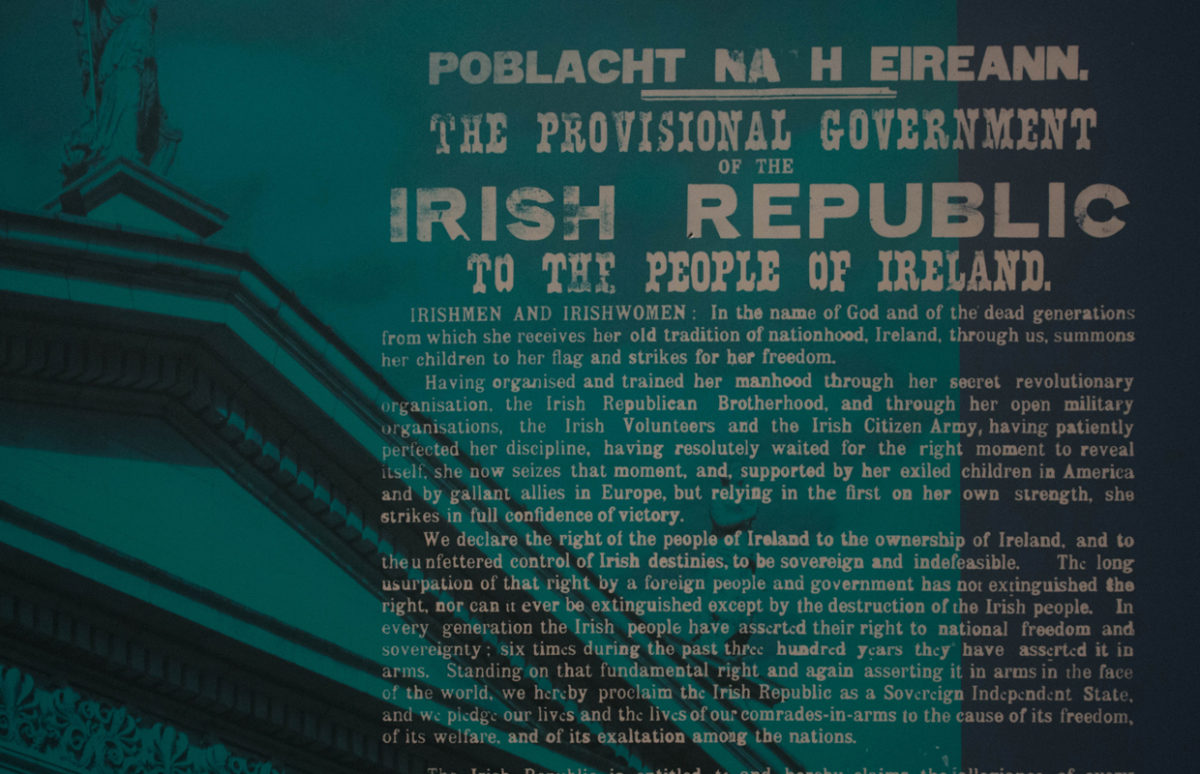The Irish Republic has organised a whole year of commemorations of the centenary of the Easter Rising, which took place on Easter Monday, 24 April 1916. It was one of the founding events of the Irish Republic, but was and remains an equivocal and divisive rebellion. It is an excellent topic for a Lieux et formes du pouvoir theme and presents opportunities for an EPI with history and geography.
The rising was a rebellion by nationalists against British colonial rule. Although it failed, it raised public awareness of the nationalist cause. The perceived cruelty and arrogance of the British authorities' reactions rallied many people to what had been a minority campaign.
Ireland had been colonised in varying degrees by the English and then British from the 12th Century. A succession of British kings, short of cash to pay for wars and imperial expansion, paid soldiers by giving them land in Ireland. It had a double advantage for the monarchy -- it solved a financial problem and created a ruling class loyal to the monarch to keep the Irish peasantry in check.
In 1801, Ireland became part of the United Kingdom. Like the rest of the U.K., Ireland was ruled from Westminster. And like the rest of the U.K., the Irish elected MPs to represent them in Parliament. Not all the population could vote, but that was the case everywhere in the U.K. All men only finally got the vote in 1918, and all women on 1928.
Famine
Resentment against the British grew, particularly after the terrible potato famine of 1845-48. The Irish peasants' main food crop failed and 1.5 million starved to death while British landowners continued to export food from the island. Another million were forced into emigration.
This led to the rise of the Home Rule movement, pushing for a devolved Irish Parliament for home affairs, much like the ones in Scotland and Wales today. Legislation in favour of Home Rule was finally passed in 1912. It was due to come into effect in 1914, but resistance from the Unionist, Protestant, minority, and the outbreak of WWI, put it on indefinite hold.

WWI and the Easter Rising
The groups on both sides of the Home Rule divide called on their supporters to join the army, in the belief that their support would be rewarded after the war.
But a minority in the nationalist camp opposed such collaboration with their traditional enemies, the British. Why should they die for the British king they didn't recognise? And while the British army was so occupied elsewhere, there was a perfect opportunity to attack, and hopefully defeat, them in Ireland.
The organisers of the Uprising managed to keep their plans perfectly secret, even as they negotiated with Germany's Kaiser Wilhelm for a delivery of weapons. But the ship carrying them was intercepted by the British three days before the Rising.
The Rising itself took place on 24 April, Easter Monday. A few hundred rebels seized the General Post Office in Dublin, a symbolic government building. At first, they had the benefit of surprise, but soon the British army retaliated. About 450 people were killed during the Rising, and 2,000 wounded, the majority of them civilians. After six days, the rebels were obliged to surrender. Sixteen of them were executed, which turned public opinion in favour of the Rising. It was the start of an armed struggle and a civil war, which would culminate in the creation of the Irish Free State in 1921 and the Irish Republic in 1948.

Commemoration
The commemoration of the Easter Rising is a difficult exercise for the Irish government. It is difficult to ignore this founding event of the current republic, but it revives divisions that have never really gone away. Despite the uneasy peace since the Good Friday agreement in 1999 (Easter seems particularly linked to Irish historical events), there are still Republicans who believe in a united Ireland, and Unionists who believe the Republicans will stop at nothing to achieve it. The recent Brexit referendum, in which Northern Ireland voted to remain in the European Union, revived calls once again for a united Ireland within the E.U.
The Rising itself is problematic. Beyond the issues of commemorating any event where there are deaths, and in this case, more civilians than combatants (another theme in Irish history) support for the Rising was far from black and white. The rebel nationalists were a minority, and accepted the help of Germany in the midst of WWI.
Tag(s) : "1916" "commemoration" "human rights" "Ireland" "Irish history" "lieux et formes du pouvoir"





